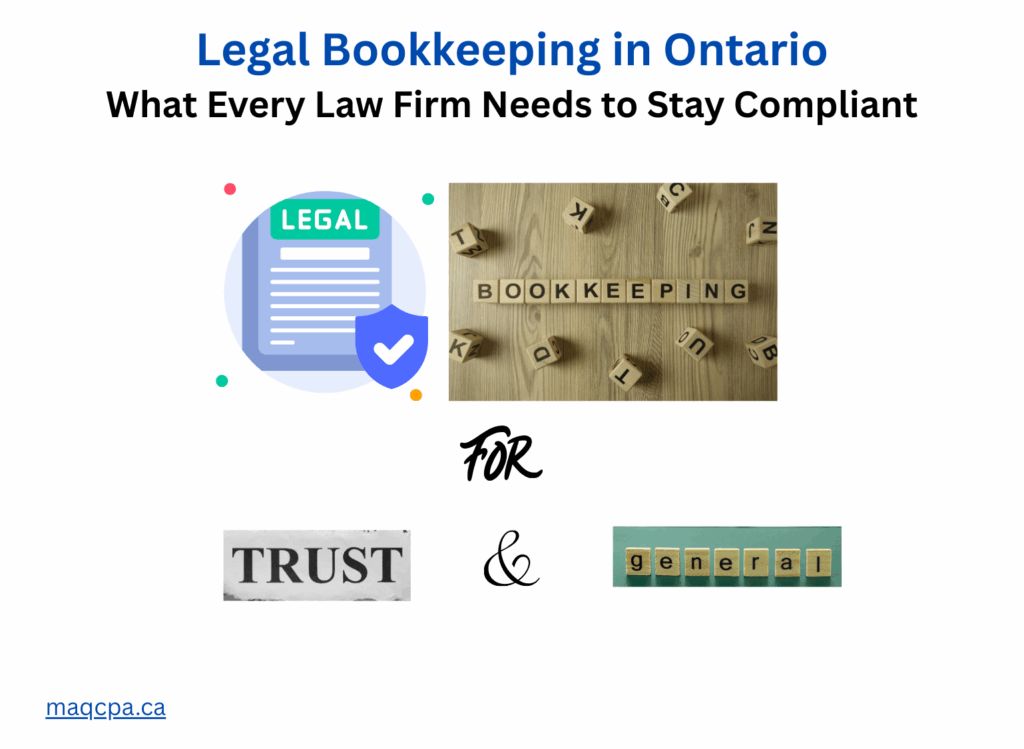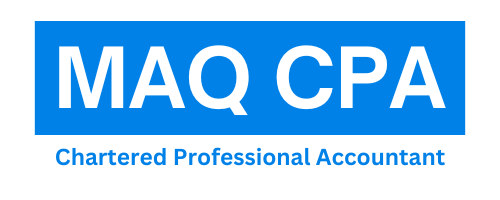Bookkeeping for law firms in Ontario isn’t just a good business practice — it’s a regulatory obligation. If your records are off, incomplete, or out of sync with trust rules, the Law Society of Ontario (LSO) or the Canada Revenue Agency (CRA) may come knocking.
Many law firms — especially solo practitioners and small firms — don’t realize that legal bookkeeping is fundamentally different from general bookkeeping. It involves unique requirements around trust accounting, client ledger tracking, monthly reconciliations, and record retention.
In this guide, we’ll walk through what legal bookkeeping really means in Ontario, how to meet all the LSO and CRA rules, and how a qualified CPA can protect your licence — and your peace of mind.

✅ Key Takeaways
- Legal bookkeeping in Ontario must meet LSO trust accounting rules and CRA financial reporting standards.
- Trust accounts must be reconciled monthly, tracked by client, and never co-mingled with general funds.
- LSO audits are random and detailed — and errors could cost you your licence.
- DIY or generic bookkeeping often fails to meet legal-specific needs.
- A CPA firm or legal bookkeeper Toronto specializing in Ontario law firms can ensure audit readiness, compliance, and scalable systems.
📖 What Is Legal Bookkeeping?
Legal bookkeeping is the specialized recording and reconciliation of financial transactions within a law firm — with strict attention to trust accounting regulations, client funds, and regulatory compliance.
Unlike general bookkeeping, legal bookkeeping in Ontario must:
- Maintain separate trust and general ledgers
- Track all client retainers and disbursements
- Prepare monthly trust account reconciliations
- Ensure GST/HST accuracy for legal services
- Retain detailed records for at least 6 years
Lawyers are held to a higher financial standard than many other professionals. Sloppy recordkeeping isn’t just bad for business — it’s grounds for discipline.
⚖️ LSO Compliance: Non-Negotiables for Ontario Law Firms
The Law Society of Ontario (LSO) governs lawyers and paralegals in Ontario and requires detailed financial recordkeeping.
Key LSO compliance items include:
| Requirement | Details |
| Separate trust and general accounts | Trust funds must not mix with firm funds |
| Monthly trust reconciliations | Complete monthly within 25th of the following month |
| Client trust ledger | Maintain balances per client matter |
| Retain records for 6+ years | Physical or digital, securely stored |
| Annual filings and inspections | Random audits are increasing |
🔗 LSO Reference: LSO Record Keeping Guide
🏦 Trust Accounting Rules You Can’t Ignore
Trust accounting is where most lawyers get into trouble — and where most LSO investigations begin.
✅ You must:
- Open a designated trust account at a financial institution
- Record every trust receipt/disbursement per client file
- Reconcile the trust account monthly
- Keep supporting documents (deposit slips, cheques, invoices)
- Never withdraw more than is held in trust per client
❌ Common Errors:
- Rounding off interest or bank fees from trust
- Using pooled trust funds for multiple client expenses
- Not keeping separate ledgers by client
- Skipping monthly reconciliation
📋 CRA Requirements for Law Firms
In addition to LSO compliance, law firms must also meet CRA bookkeeping and tax standards, including:
- Recording all income and disbursements (billable or not)
- Charging and remitting GST/HST where applicable
- Keeping records of client invoices and expense receipts
- Tracking payroll, if incorporated or employing staff
- Retaining all financial documents for at least 6 years
💡 CRA penalties often stem from:
- Incomplete GST/HST filings
- Disallowed legal disbursements
- Payroll remittance errors
- Inconsistent income reporting vs. bank activity
Reference: CRA – Keeping Records
⚠️ Common Bookkeeping Mistakes That Trigger Audits
| Mistake | Risk | Resolution |
| Not reconciling trust monthly | LSO discipline | Automate tasks or hire expert |
| Using a generalist bookkeeper | Missing trust protocols | Hire legal-specialized CPA |
| Delayed GST/HST filings | CRA penalties | File in time with calendar reminders |
| Incomplete client ledgers | Disbarment risk | Use practice management systems |
| Failing to document expenses | CRA disallowances | Keep digital/paper receipts for 6 years |
👩💼 Signs You Need a Legal Bookkeeper Toronto or CPA
You should seriously consider legal bookkeeping help if:
- You’ve recently incorporated (PC) or plan to
- You’re behind on reconciliations or filings
- You have more than one trust account
- You use generic bookkeeping software (e.g., QuickBooks only)
- You’ve received an LSO or CRA inquiry letter
- You want to scale or sell your practice
A CPA who understands LSO rules, CRA expectations, GST/HST, and legal billing systems can save you money and legal risk.
FAQ – Legal Bookkeepers Markham / Mississauga
What makes legal bookkeeping different in Ontario?
Legal bookkeeping in Ontario must follow LSO trust accounting rules, requiring client-specific ledgers, monthly reconciliations, and strict fund segregation.
Can my assistant or office manager do our legal bookkeeping?
Only if they are trained in LSO rules and CRA filing. Mistakes in trust accounting can lead to discipline. Many firms outsource this to a legal bookkeeper Scarborough familiar with law firm workflows.
How often do I need to reconcile my trust account?
Monthly — without fail. The LSO requires it completed within 25th of the following month even if there were no transactions.
How long must I keep records?
At least 6 years from the end of the last tax year they relate to. This includes ledgers, receipts, invoices, and bank statements.
What are the biggest legal bookkeeping red flags?
- Unreconciled trust accounts
- Missing or inconsistent client ledger entries
- GST/HST return discrepancies
- Use of pooled trust funds for unrelated clients
Final Words
Legal bookkeeping in Ontario is high-stakes and non-negotiable — especially if you handle trust funds. The margin for error is slim, and the consequences are serious. But with the right systems, support, and a legal bookkeeper Toronto or CPA that understands your legal obligations, compliance becomes a strength — not a burden.
📞 Need help staying LSO- and CRA-compliant?
We support law firms across Toronto, Markham, Scarborough, Mississauga, and the Ontario with full-service legal bookkeeping and tax filing.
👉 Book a Consultation today and let’s make your law firm audit-ready.
Read our services about Bookkeeping for Law Firms.
Disclaimer
The information provided in this blog is for general informational purposes only and does not constitute professional accounting, tax, financial, or legal advice. While we strive to ensure the accuracy and timeliness of the content, the information may not apply to your specific situation or reflect the most current legislative changes. Readers are strongly advised to consult a qualified professional before making any decisions based on the content of this blog. MAQ CPA and its representatives disclaim any liability for any loss or damage incurred as a result of reliance on any information provided herein.
